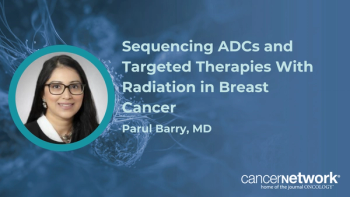
Oncology NEWS International
- Oncology NEWS International Vol 15 No 9
- Volume 15
- Issue 9
TH, TCH Have Similar Efficacy in Breast Ca
When used as first-line therapy for metastatic HER2-positive breast cancer, docetaxel (Taxotere) plus trastuzumab (Herceptin) (TH) has similar efficacy to docetaxel, carboplatin, and trastuzumab (TCH), but the toxicity profiles differ, finds a randomized phase III trial presented at the 42nd Annual Meeting of the American Society of Clinical Oncology
ATLANTAWhen used as first-line therapy for metastatic HER2-positive breast cancer, docetaxel (Taxotere) plus trastuzumab (Herceptin) (TH) has similar efficacy to docetaxel, carboplatin, and trastuzumab (TCH), but the toxicity profiles differ, finds a randomized phase III trial presented at the 42nd Annual Meeting of the American Society of Clinical Oncology (abstract 516).
"Docetaxel, carboplatin, and trastuzumab are all active agents, and there is a substantial biological basis for suggesting that carboplatin and Herceptin may be synergistic," said John F. Forbes, MD, professor of surgical oncology, University of Newcastle, Australia.
Patients eligible for the multicenter trial (BCIRG 007) had HER2-positive metastatic breast cancer and had not received any treatment for their metastatic disease. They were assigned to THeight cycles of docetaxel 100 mg/m2 every 3 weeks plus trastuzumab 2 mg/kg weekly after a loading dose, followed by maintenance trastuzumab 6 mg/kg every 3 weeks until progressionor TCHeight cycles of docetaxel 75 mg/m2 every 3 weeks plus carboplatin to AUC 6 plus trastuzumab, followed by maintenance trastuzumab. The docetaxel dose was reduced in the TCH arm, Dr. Forbes said, because the lower dose was one they "believed would be readily deliverable with acceptable toxicity."
A total of 253 patients were enrolled. The median duration of follow-up was about 28 months in each group.
By intention-to-treat analysis, there was no significant difference between the TH and TCH groups in the median time to progression, the trial's primary endpoint (11.1 vs 10.4 months, respectively), Dr. Forbes said. In addition, the two groups had essentially the same rates of overall response (72.5% vs 72.7%) and median duration of response (10.7 vs 9.4 months). Median overall survival was also statistically indistinguishable, with the value not yet reached in the TH arm and 41.7 months in the TCH arm.
Toxicity Results
In terms of nonhematologic toxicities of any grade, patients in the TH group had higher incidences of sensory neuropathy (57% vs 44%), myalgia (44% vs 31%), rash/desquamation (32% vs 15%), and nail changes (55% vs 33%).
Patients in the TCH arm had higher incidences of grade 3-4 thrombocytopenia (15% vs 2%), nausea (3.8% vs 0%), and vomiting (3% vs 1.5%).
Grade 3 compromise of cardiac left ventricular function occurred in one patient in the TH arm and none in the TCH arm; there were no grade 4 occurrences. About 5% to 7% of patients in each treatment group had a greater than 15-point absolute reduction in left ventricular ejection fraction.
No Synergy?
The two regimens have differing toxicity profiles, but both are efficacious in the population studied, Dr. Forbes concluded. "We have failed to find an important clinical difference. Maybe there isn't any. Maybe the synergy in this setting doesn't work. Perhaps the lower dose of the taxane might have been important in the combination arm, but there was a consensus that we really couldn't take it that much higher," he said.
Dr. Forbes pointed out that the US Oncology data presented at the ASCO 2004 annual meeting did show an advantage for adding carboplatin. There were, however, important differences in that study, he said, including its smaller size, lack of mandated FISH assessment of HER2 status, use of paclitaxel instead of docetaxel, and relatively poor outcome in the treatment arm that did not receive carboplatin.
Articles in this issue
over 19 years ago
Exjade Gains Approval in EUover 19 years ago
President's Cancer Panel Assesses Progress in Two Areasover 19 years ago
Cognitive Rx Reduces Depression in Breast Ca Ptsover 19 years ago
Nurses Develop Evidence-Based Guidelines for Mucositisover 19 years ago
Anastrozole Therapy for Breast Cancer Affects Bone Healthover 19 years ago
Is Demand for Trial Subjects Outpacing Supply?over 19 years ago
Postchemo Disappearance of Liver Mets Doesn't Mean Cureover 19 years ago
Aromasin-Related Bone Loss Affected by Vitamin D LevelsNewsletter
Stay up to date on recent advances in the multidisciplinary approach to cancer.







































